Sometimes writers independently cover the same topic, approaching a common subject from unique perspectives. Critical Discourse is our attempt to bring these perspectives together in a direct conversation, where writers discuss work their ideas together.
In this edition we invite three writers regularly featured at Critical Distance to discuss the theme of Danger. Gita Jackson opens the topic by confessing at Offworld,”I’m afraid to die in games“, where she ties her experience with danger to the simulated danger in videogames; also at Offworld, Aevee Bee writes “I love my untouchable virtual body” to argue that true empowerment isn’t in eliminating vulnerability, but controlling the conditions of vulnerability; finally, Nick Dinicola over at PopMatters claims that “She Who Controls the Flashlight, Controls the Horror” in analysing how the different abilities and avatars augment how Resident Evil: Revelations 2 creates tension.
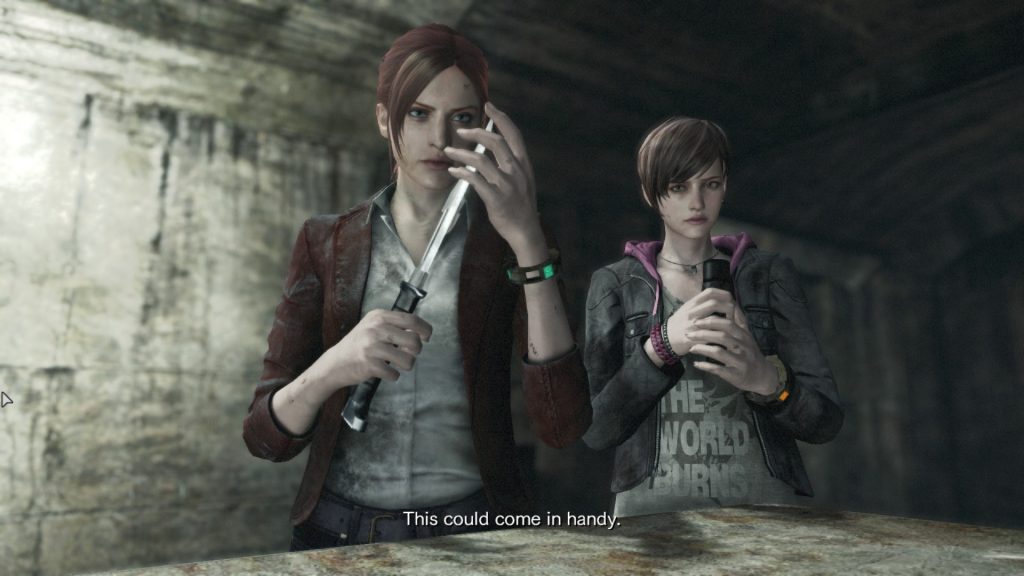
Gita:
Aevee, Nick,
I guess I should just get the heavy shit out of the way — I cannot think about danger, or death, in any medium without thinking about my dead friend, Matt. He’s something that hovers constantly in the back of my mind. I’m beginning to forget the particulars of him, of course, and I can now hardly recall the sound of his voice or his specific mannerisms. But danger is forever entwined with him in my brain.
Which is why, of course, my own article about death ended up being about Matt as much as it was my father. I remember quite clearly being so hurt when another teenager told me that if Kurt Cobain committed suicide, he must have been a coward. What does that say about me, and my suicidal thoughts, then? What did that say about Matt, and his heroin? How can we actually be compassionate and foster rehabilitation re: self harm when these untimely deaths are wrapped up in a sense of failure?
I particularly like your piece, Aevee, for flipping this idea on its head — that perhaps the desire to be dangerous is the antidote to the fear of death and failure. It’s something that I have thought about all the time but I guess had never seen articulated in a way that made sense to me. Why else do I wear Doc Martens and scowl on the bus? I loved in particular your description of Ramlethal, of being able to summon up a wall of swords to protect against vulnerability. What a dream!
I think it’s vulnerability which is the through thread, really, in all these articles. Nick, while your description of Resident Evil: Revelations 2 is compelling, it’s also an exact recipe for something I absolutely don’t want to be immersed in. Horror, which is something I can handle in movies, is just something I can’t do at all in videogames, precisely because they are always making you vulnerable. It’s no great wonder why women so often are the protagonists in horror games and movies — when you are a marginalized person, to be vulnerable is to be in a state of danger.
Anyway – what do you think about all this, about failure and vulnerability and all that? To me, these are the things that make games impossible to play when they make me interface with them. I mean, they’re powerful states of being, but I’m not ever sure that games use them responsibly, if you know what I mean? I feel like so often I succumb to danger when I feel the fear of failure or that I know that I am vulnerable. Maybe I’m just bad at videogames.
Best,
Gita
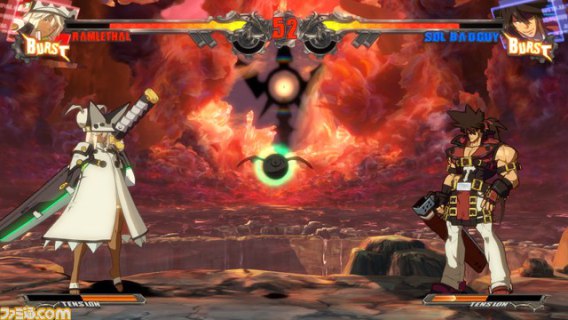
Aevee:
Everyone—
I’m so glad you bring up vulnerability, because in my article I didn’t really get into the circumstances under which vulnerability is welcome, even though it’s the crux of the whole topic of danger; there’s no danger without vulnerability, of course! My essay might make it sound like I never want to be vulnerable ever, but it’s more about wanting to control when and where and to whom I am vulnerable.
Because, you know, I actually want vulnerability! Instead of “untouchable” I want to be conditionally touchable. That’s kind of why I like both horror games and dating sims (which I know sounds kind of perverse) because they are all about vulnerability under extremely controlled and (for the most part) consented to conditions. Comparisons between consent/intimacy and the rules of games have been made often, but if we all clearly have different circumstances under which we’ll allow ourselves to be vulnerable, even in a game, that suggests a great deal of unexplored texture to both personal preferences of the ways we wish to be vulnerable, and the ways in which games create vulnerability in a way that’s safe.
It’s a very different kind of vulnerability than physical danger, but I’ve been embarrassingly obsessed with these audio transcripts of the latest Fire Emblem game lately; the tactics RPG is now as relationship focused as a Bioware game, except it’s at least on me ten thousand times more effective because instead of very unconvincing and awkward PG-13 uncanny valley polygonal sex scenes the new Fire Emblem conveys intimacy with what’s like…obscene ASMR for anime nerds I guess? Virtually every character in the game has dialogue recorded by professional voice actors where they whisper sweet nothings in you and use tricks with diurnal audio to make it sound like they’re literally whispering directly in your ear. It’s physically intense and makes me so embarrassed I can’t listen to more than five seconds at a time.
But I guess I’m just in awe of how effective it is, when most attempts at vulnerability and sexuality in games leave me completely cold. Certainly a lot of the content is indefensible, but there’s a fundamental understanding of what makes for genuine intimacy and sexuality without being explicit, by keeping everything in the context of a relationship, and it’s completely opt in? They’re all very clichéd personalities, but you get to pick your fantasy, and though some of the characters are really aggressive, sadistic, forceful, and lewd in ways that would totally disgust me from a stranger, from these fictional characters in this designated safe setting I’m okay with it, the same way chosen friends can talk to me in ways that I want absolutely no one else to.
There are also characters who are protective, shy, comforting in so many different ways in addition to being forward and mean; there’s like 60+ characters that all are basically giving you a different texture to intimacy and vulnerability and like, most of them are clichéd and fetishy, but I mean, there is actual texture to this, right? I’m a lot more okay in failing in a single player game by myself than in front of people online who will yell at me, for an obvious example. What makes the vulnerability safe, or acceptable, or whatever the most precisely right word for it is, for you?
—Aevee
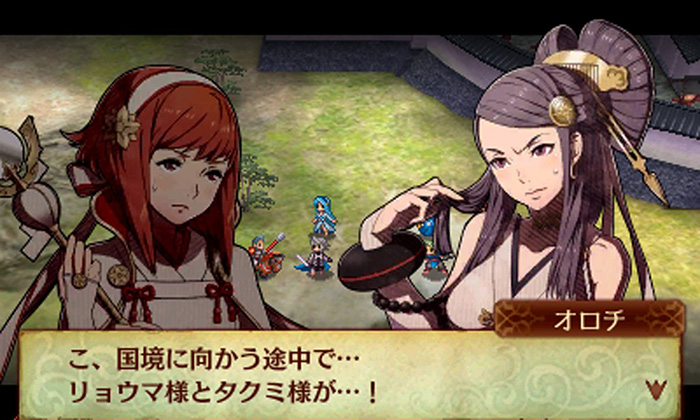
Nick:
Hi Gita, Aevee,
I like your idea, Aevee, about games letting us control when and how we’re vulnerable. When done right, when we’re faced with danger within the context of a “safe” fantasy, it becomes easier to explore the boundaries of those vulnerabilities.
I think that Fire Emblem feature sounds kind of neat. I’m perfectly willing to let 60+ virtual characters whisper in my ear, heck I’ll even let 60+ FMV cosplaying strangers whisper in my ear, yet I’m not about to ask even one actual stranger to whisper in my ear. I agree that it’s a matter of control. The moment I add another person I’m sharing that control, but no matter how vulnerable a game makes me feel, whether through intimacy or horror, I know it’s all a simulation that I, alone, am in control of.
I can delve into that disturbing horror game that makes me genuinely afraid of the dark, the kind that makes me too scared to get a midnight snack because I don’t know what waits in my kitchen, because I know in the back of my mind that this fear is still part of the game. I’m letting fiction bleed into reality. If I really want that snack I’ll go get it because my kitchen is empty and I know that.
No matter how vulnerable a game makes us feel we’re ultimately not vulnerable at all. If we’re too uncomfortable we can stop the loving whispers after five seconds and no one will think differently of us. Our experience is a secret between us and the computer, and that a good safety net to have when exploring such deeply personal issues like vulnerability.
Along that same train of thought, I think one of the best things games can do is to let us explore not just our own vulnerabilities, but others’ as well.

I agree with your sentiment, Gita, that games often misuse the threat of vulnerability. It’s usually just for exploitation, but I think they can still speak to a higher truth within that exploitation. While Revelations 2 isn’t a great game, it’s the only game (I can think of) that seems interested in how danger manifests between different people.
As Barry, I fight against deformed monsters that emphasize my normalcy; it also plays like a stealth game and is thus a struggle to maintain control. As Claire, I fight against hulking monsters that emphasize my physical stature; it also plays like an action game and is thus a struggle for my life. It’s a difference that stuck with me, and made me think of that quote, “Men are afraid women will laugh at them. Women are afraid men will kill them.” [this well known quote is a paraphrased anecdote typically credited to novelist Margaret Atwood – ed.] The game uses different types of physical danger to contrast the experience of facing horror as a man with the experience of facing horror as a woman. One fights for power, the other for survival. Yes, the game is exploitative and violent as hell, and I’m still just killing monsters either way, but for a few hours I felt like I understood what it was like to kill monsters as someone else.
I think danger is too often universal in games. We get a set character, and fight through a world filled with generic physical dangers, or we get to design a character but they’ll face the same dangers as everyone else. The world rarely tailors itself to hurt us as much as possible, and I think that’s a bad thing. Understanding the unique dangers facing an individual can be revelatory. Danger is intimate, like the whispers of a virtual lover, and intimacy, hopefully, leads to empathy. And if it ever gets to be too much, I can always turn it off.
Of course, I don’t want every game to be like that. Sometimes I just want a good ol’ power fantasy, but I think there’s something to be said for a game that can introduce us to new forms of vulnerability. They don’t even have to be physical, a game could show us internal dangers like those in Depression Quest or financial dangers like those in Cart Life.
What do you think? Should a game try to be more personal with its dangers, or would that just open the door to more forms of misrepresentation? Would either of you even want to play a game like that?
-Nick
Gita:
Dear everyone,

Aevee, I’m so glad you mentioned Fire Emblem because I love it — it’s the only game where I feel like I’m experiencing vulnerability in a safe way. Because each new interaction with a character happens in a discrete, game-y way, I feel like the game is asking me to wade myself out into the water, get comfortable with being open. It feels normal and natural to start to love those characters, I don’t feel an intense fear when I start to be invested.
And this, Nick, is where I begin to feel a disconnect between you and me. When I play a horror game, there is no sense that the fear is part of the game, for me. The fear is a real fear. Last night, I wanted to watch a Let’s Play of P.T., I made myself stop because I knew what would happen. I wouldn’t sleep, I would think every noise was someone else in my home, it would haunt me.
This is why I don’t have a lot of faith in the idea that videogames are special because they are immersive. All media asks you to connect on an emotional, nearly physical level. When I watch a scary movie, I am genuinely frightened. When I read a romantic book, I genuinely feel romantic. When I engage with a game that asks me to feel certain things, I feel them as with any other piece of media, but more often in games than other media, I feel as if I am left to sort out those emotions myself, that the game doesn’t give me a safe outlet to understand why I am being made to feel that way.
I can’t just turn off a game to escape a feeling — those feelings exist within me. There is no escape. I think that games are irresponsible with the feelings they evoke because they use them, often, for a cheap thrill. I’m expected to be like you, Nick. But I’m not. In my body, vulnerability is a real and present danger. I don’t want to feel vulnerable for entertainment. It’s the same reason why I hate roller coasters — the fear of death isn’t exciting for me.
I would, though, like to see more games like Depression Quest or Cart Life, or even more games like Tokimeki Memorial: Girl’s Side or Analogue: A Hate Story — games that have a reason for evoking emotions that are powerful, overwhelming, that have something to say by making their players experience them. Most mainstream games, I think, just want the players to feel something, but leave it at that. And that’s why I don’t play a lot of mainstream games anymore. It hurts too much.
Best,
Gita
Aevee:
Everyone—
When I was pretty young — around twelve or so — I had an older teenage friend who exposed me to ultraviolent anime, pen and paper RPGs, videogames, and generally the weirdest evil stuff too inexcusably violent and sexualized to be for children yet so obviously unsophisticated you couldn’t call it adult, and I was SUPER into it. I’ve had a lot of conversation with Rory Frances, ZEAL bee and comics artist, about how we kind of thought we needed to seek out stuff to traumatize us? This stuff was absolutely what you’re talking about, Gita; totally irresponsible with the emotions of the audience, transparently manipulative, and with no good or higher intention.
I don’t do this to myself any more — I wanna watch like, Steven Universe now. I don’t have an immediate answer to why I intentionally hurt myself watching Genocyber and Ninja Scroll as a thirteen year old, but I think part of it is actually was, especially at that age, a lack of respect for myself, or a feeling like in order to get the approval of cool older boys I had to put myself through it? And some ways (and this will sound horrible, because it is): the horror and tactile fear of a game feels validating because it’s the release of actually experiencing the harm that I’m always in fear of and still feel like I’m imagining it or I’m crazy, even when the threat of it is real and clear and everywhere.
I still do feel an impulse to experience an unsafe kind of harm (or, something that is emotionally harmful but physically safe). I don’t think games actually have ever been very great at this — they’re really good at being scary, but I don’t have that same connection to the bodies, so they’re about as connective as a movie for me. It Follows put me in a mindset of its reality a lot more than P.T.; I had trouble sleeping and my brain kept pushing me to consider the premise seriously while simultaneously knowing it was fake, but I watched it knowing it would happen.
I do kind of wish a game would put me in a more vulnerable state, but developing a sense of self esteem has made my standards for that a lot higher. I really didn’t feel much other than like retching at the self-mutilation scenes in Heavy Rain, but it’s hard to imagine what the Fire Emblem of vulnerability would look like; something where I’m in total control, but vulnerable. Maybe this is why spoilers are kind of important to me — with those otome games, there are some where you can get boys that are super awful and mean to you that bully and do lascivious things, but like, you 100% know this is going to happen. It’s completely opt in. That violence isn’t abstract to me, but I am still drawn to it, which probably says something uncomfortable! I guess I want it ALL; to be vulnerable when I want to be vulnerable and strong when I want to be strong.
Or wait, maybe that’s just saying “I want agency over my own body.”
—Aevee
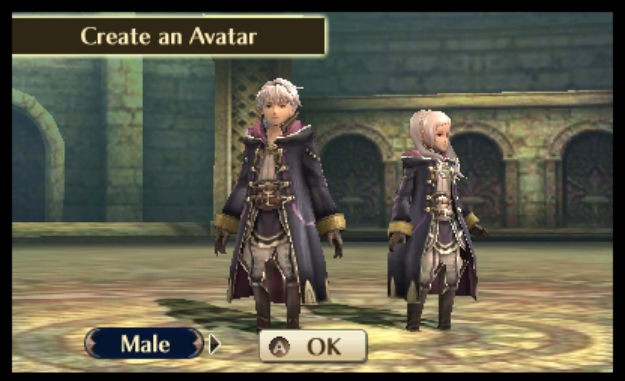
Nick:
Everyone,
I think one of the reasons Fire Emblem works so well in this regard is because it spends a lot of time building the player to that vulnerable state. Not only is it opt in, but also this “ASMR for anime nerds” scene [in Fire Emblem: Fates] comes some ways into your relationship with that character (and FYI I’m assuming this works similar to marriage in Fire Emblem: Awakening, since that’s the one I’ve played. Correct me if I’m wrong). Trust has been built with this person over time, so when the game asks you to make yourself vulnerable it does so within the context of an already trusting relationship.
It builds up to that vulnerability instead of plunging you right into it. This is a moment of vulnerability that emphasizes safety rather than danger.
That said, Fire Emblem is mainstream game and I think it very much understands what it wants the player to feel and how to make them feel that way. I disagree that mainstream games are generally confused about that. The issue, I think, is more that their language of danger is often limited.
Physical danger is what games do best because it’s so literal and intuitive. It goes back to what you said in your original piece Aevee, about how you can dodge an attack even if the geometry of the characters collide. I timed it right, the programming math was on my side, so the sword goes right through me — a predictable, repeatable, literal example of a programmed if-then statement. And this is something everyone wants to do even they’ve never played a game before, and even if they don’t know how to dodge. No one wants to be stabbed, so we all “get” this kind of danger.
Games, at least most mainstream games, are most comfortable communicating with the player through the threat of physical danger because it’s such a widely understood language, but that doesn’t mean they’re unable or unwilling to explore other themes. There’s literal physical danger, but then there’s the metaphoric physical danger. For example, any game with sanity effects is exploring mental dangers and any game with a limited resource is exploring financial dangers, but these more abstract dangers are often boiled down into something physical. Don’t get scared or you get hurt. Don’t spend your resources wrong or you get hurt. It’s physical, but it’s trying to express more than just the physical.
I think that’s why, Gita, you don’t feel that games give you a safe outlet. Because they tend to communicate in a way that specifically avoids safety. I understand how this language can be unappealing, but that doesn’t mean it’s not worth learning. This is part of how games communicate their ideas, how they translate abstract emotional things into literal programmable things.
The worst games use this danger and vulnerability purely as a means of shock; the mediocre games use them for entertainment, the cathartic thrill of surviving something dangerous; the good games use them as a means of evoking empathy for a character; but the best games use them as a conduit for the player to explore more complex feelings or experiences.
Even Fire Emblem speaks to us in this same language of physical danger. It asks: How do you make a player feel love? And answers: By removing the physical danger, by making us feel safe when vulnerable.
-Nick
Gita:
Y’all,
I’ve been sitting on replying to this and then I hit a introspective mood on a Saturday night. My allergies are so bad I feel like I have an awful cold. Every time I wipe my nose I sneeze even more. That is to say: this might get weird.
Aevee, the other day I had to stop myself from buying an anthology of Junji Ito’s work and I thought of you. I stopped myself because I am drawn to his work, I’m drawn to horror, I’m drawn to media that makes me emotionally disturbed and gets me in a dark mood. But I thought about your letter and said to myself, “What is this actually doing for me?”
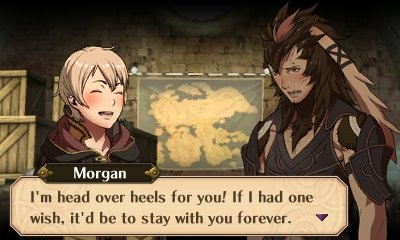
The way that a lot of games use tropes of horror — a genre I actually really love — isn’t really in service of teaching me anything about my own vulnerability. I was talking to David Wolinsky of Don’t Die over the weekend and we talked about how the bar for everything in games is so fucking low. A horror game is good if it makes you feel scared. We don’t talk about its methods of inducing fear, of the purpose of that fear — it just hits a low bar. It qualifies. It’s “good.” Comparing this to the ongoing discussion of say, New French Extremity, films like Martyrs or Inside, on the usage of extreme violence and brutality, on the merits of their methods, on films like Hostel and Funny Games and I just look at games and feel a wave of sadness. It’s good that they’re finally hitting a low, low bar. But we can’t just be happy with that.
Nick, you said that you think learning the language of vulnerability is valuable, and I do agree with you. I already speak that language. It isn’t a choice for me not to be vulnerable. My existence is fragile, it’s delicate, I put myself at risk by being black and female in a public space. What do I gain by experiencing that in a virtual space? What is there other than “and now you feel bad”? When I play games that deal with vulnerability as a feeling, I feel like they’re not for me — they’re for people who aren’t always having to navigate the spaces where they are safe or not, the spaces where they can be allowed to let their guard down. They’re for people who don’t have to protect themselves in life.
Vulnerability in games — outside of games like Fire Emblem: Awakening — deals with the negative consequences of being too open. I used to seek out media that hurt me, made me get in dark moods because I wanted confirmation that I shouldn’t ever trust anyone. I don’t need anymore of that in my life.
Best,
Gita
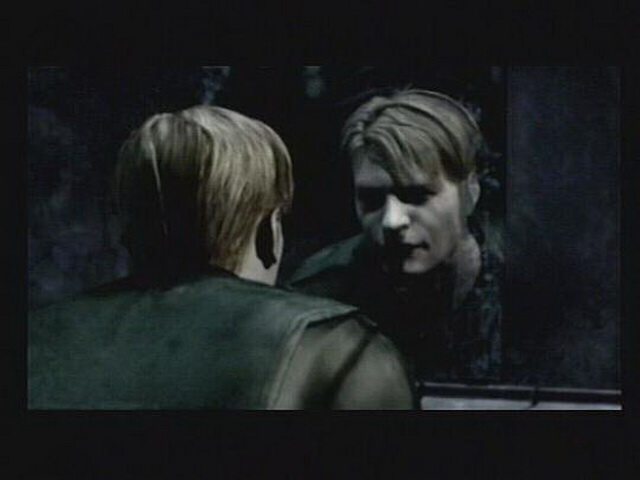
Aevee:
All,
Gita, it’s funny you mention those horror titles, because they’re some of the same ones that Mia Schwartz and I have been looking at as we develop We Know The Devil, the game we’ve been working on for the past two months. Mia’s heavily influenced by film in her comics, and I’ve found her curation and analysis of horror so much more than basically anything I find in videogames, maybe quite obviously? A monster that pops up when you don’t expect it is trivial, but the films you mention go into much more layered textured forms of danger. Nick, you bringing up games that have “sanity meters” or their equivalent actually point to the ineptitude games have at depicting layered violence and danger.
“Sanity” can’t be reduced to a meter, and grievous misunderstandings of mental health aside, the danger these systems try to articulate is about as surface level as the violence, full of jump scares and cheap tricks as they are! We’ve got a lot of films that take us on extremely harrowing journeys through someone’s mental and emotional state, but video games usually give us a pretty impersonal palette, maybe because the protagonists are often ciphers and the focus is on the player, but maybe just because the bar is low. There’s the perennial exception, Silent Hill 2, of course, which owes a lot to film, but also functions because it gives so much visibility and interiority to its protagonist and cast.
I don’t think that horror games are categorically just for people who don’t experience vulnerability in real life — just knowing how many people I know who are and still enjoy them — but I do agree that the language of vulnerability that most games speak is some third grade grammar lesson, “see spot jump, see spot run from zombies” level stuff. It’s boring to us because the concept of vulnerability itself is nothing new.
I watched Possession, this 1981 film with Isabelle Adjani a few months ago, and that is a film that sure has a language of vulnerability, of all sorts of textures. There’s a lot going on in that movie, and it’s horrifying and surreal, but it’s also very centralized on this couple separating, with a man who is extremely reasonable and logical and his wife who utterly refuses to give him any sort of satisfaction and absolutely won’t be cowed. Her performance is so intense and so hard to watch, but it made me feel understood on some level? Like, he wants to talk to her calmly and logically pressure her into doing things she absolutely doesn’t want to do, no matter how reasonable they sound, to the point simply screaming at him is the only way she can get him to respect her agency. Or I say, ‘respect’ but he clearly doesn’t respect her agency at all, so this is all she can do to make him shut up. He can be scary and violent but he’s always so terrifying reasonable, and that’s a power he has and uses over her that she is fighting in the only ways she has.
When we talk about vulnerability, we also need to talk about power, and what I think is deeply captivating about Possession is that it validates and articulates the ways I feel powerless by showing the sort of power you are forced to resort to when no one will take you seriously or listen to you. Horror games do limit your power for the sake of establishing vulnerability, but rarely in interesting ways, and rarely in ways that say anything at all about the systems of power in play. In survival horror it’s mostly what — tank controls? It’s not a very interesting statement, it’s just hard to control.
Resident Evil Revelations 2 sets up this clear power difference between those character pairs, but I’m not sure there’s anything to it other than that asymmetrical co-op? I mean, there could be something really interesting here, I think? Well, there may be interesting unintentional statements about who gets the power or what power is, or what kind of power goes to those who are weak. I can project a lot onto [Guilty Gear Xrd‘s] Ramlethal because there’s so much personality and texture to how her body works and moves through space, and how she interacts with other characters with big personalities and lots of texture. But even this isn’t very sophisticated and intentional, which I think are very strict prerequisites for dealing with violence and interiority of the kind horror games often aspire to, but rarely reach.
—Aevee
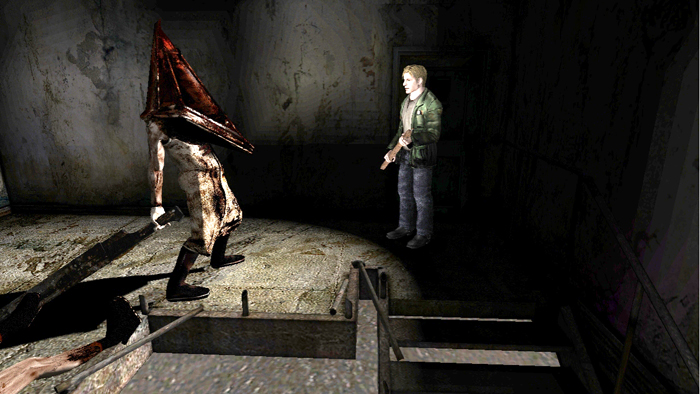
Nick:
Everyone,
I do think that the vulnerability we face in real life affects the kind of vulnerability we seek or accept in our entertainment. As a middle-class white guy with a short commute so I don’t even have to worry about traffic, I find most representations of vulnerability — even those third grade grammar lessons — extremely valuable. Your redundant danger is my revelation.
This just might be a personal preference, but I find a few hours with Cart Life to be more affecting than any number of news stories or documentaries about poverty. The game makes me feel the personal weight of things I take for granted now: What do you do when the bus is too expensive but it’ll take too long to walk to work? I can watch people talk about that choice and sympathize with them, but it’s a whole other thing to make me feel the emotional reality of that catch-22.
This is beneficial because if danger (whether physical, financial, mental, or other) can evoke empathy and not just fear when used correctly, as I believe it can, then this is an empathy I can bring back into reality. A slightly better understanding of the world beyond my narrow view. It’s not just empathy for a character, but for another human being.
In my experience I’ve found many games that evoke danger and fear like this — for a purpose greater than just… fear.
Yes, Silent Hill 2 is a perennial example, but it’s also a dated one. I prefer Silent Hill 4: The Room for how it confronts the power/vulnerability dynamic of voyeurism, or Silent Hill: Shattered Memories for asking why we throw monsters at ourselves in the first place, or The Music Machine’s contrast of hate versus indifference, or Bloodborne’s conversation with Lovecraft.
For every Martyrs, Inside, Hostel, or Funny Games, there’s a Telltale’s The Walking Dead, Metrolith, The Cat Lady, or Catachresis: Games that put us in danger and then explore the mechanisms behind that danger.
And then for every straightforward but effective Alien there’s a Dead Space. And for every mediocre but thematically interesting The Purge there’s a Resident Evil: Revelations 2.
There’s a variety of danger in the gaming space. It’s not all exploitative, and there’s value in a “dangerous” gaming experience. I can’t defend the games that use danger irresponsibly and abusively, but I do defend the games that use all sorts of dangers to facilitate thoughtful experiences, and I think games hit and miss that mark with the same ratio as movies.
I think the greater issue is that gaming offers us almost nothing but “dangerous” experiences. There aren’t many light hearted affairs, and even those that exist often still use the language of danger to explain their mechanics: You can still die in any platformer and you can still crash in any racing game. If I just want to laugh I gotta turn off the PlayStation and switch to television. Gaming is all danger all the time, and while danger isn’t inherently bad, it can get exhausting after a while.
-Nick
And just like that we close this edition of Critical Discourse. Once again I thank Gita Jackson, Aevee Bee and Nick Dinicola for such an engaging discussion along with all of our readers. If you have any suggestions for who we should invite or what topic you’d like to see covered in the future for Critical Discourse, don’t hesitate to send us an email or a mention on our twitter.
All of our features on Critical Distance are made possible by the contributions of our readers through our Patreon. If you’d like Critical Distance continue and expand on our coverage of games writing please consider setting up a monthly donation to fund our work here. It’s been a pleasure as always and we’ll see you again real soon.


